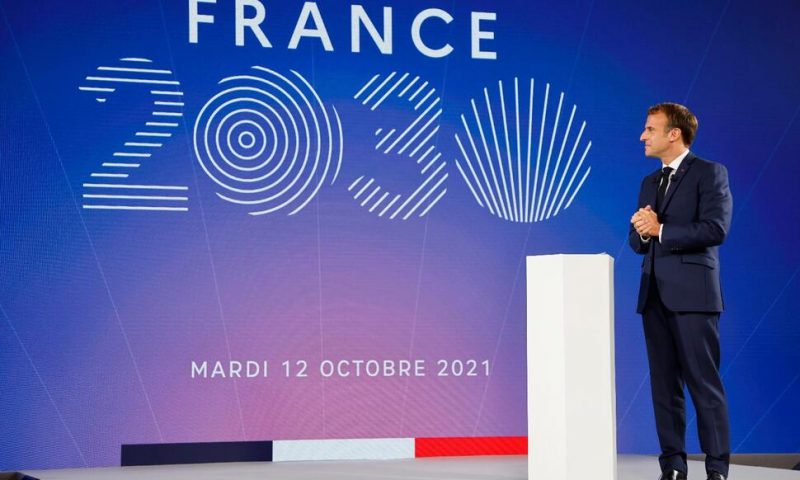French President Emmanuel Macron has unveiled a 5-year, 30 billion-euro ($35 billion) investment plan for developing innovative technology, including small nuclear reactors, electric cars and greener airplanes.
PARIS — French President Emmanuel Macron on Tuesday unveiled a 5-year, 30 billion-euro ($35 billion) investment plan for developing innovative technology and industrial activity, including building small nuclear reactors, electric cars and greener airplanes.
The goal of the state-funded France 2030 plan is to boost France’s economic growth over the next decade amid growing global competition with China and the United States, Macron said. The money will start being spent next year, he said.
“If us, Europeans, and especially us, the French, want to be able to choose our future, it is key that we win… the battle for independence and better living conditions,” Macron said.
The plan includes 8 billion euros ($9.2 billion) to develop energy technology that would help reduce greenhouse gas emissions.
Macron said the funding would finance the building of small, modular nuclear reactors in France, which relies on nuclear power for 70% of its electricity.
European Union leaders agreed two years that nuclear energy could be part of the 27-nation bloc’s commitment to making its economy carbon-neutral by 2050, giving member countries the option of using it in their national energy mixes.
The issue led to heated debates within the EU, however, with Germany and some other countries arguing that nuclear power should not be included in plans to finance greener energy because it requires mining and long-term storage of radioactive waste.
In his announcement Tuesday, Macron also vowed to make France by 2030 “the leader of green hydrogen” power, a form of energy which does not emit carbon dioxide and can be used in industries such as steel and chemical manufacturing that currently rely on fossil fuels.
The plan calls for 4 billion euros ($4.6 billion) to be used to develop about 2 million electric and hybrid cars by the end of the decade.
In addition, France will “massively invest” in building its first “low-carbon plane” by 2030, a project likely to involve European cooperation, Macron stressed. He did not give details about which technology would be used. The plan also provides money to develop by 2026 a reusable launch system to propel spacecrafts.
France’s strategy is intended to support innovative technology in other sectors, including food production, the film industry and medicine.
Macron presented the plan as the continuation of policies his government implemented in the past four years to reduce business taxes and encourage hiring and investment.
The 43-year-old centrist president has not yet announced if he will run for reelection next year, but he is expected to do so. Macron was elected in 2017 on a pro-European, pro-business platform.

